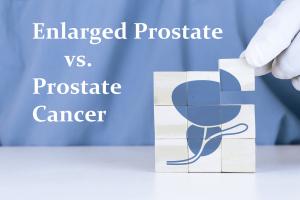
Dr. David Samadi: Why Men Should Know The Different Symptoms of an Enlarged Prostate vs. Prostate Cancer
NYC Prostate Cancer Surgeon Explains Why BPH and Prostate Cancer Can Have Similar Symptoms—and Why This is of Critical Importance for Men’s Health
"Prostate issues can often present with similar symptoms, but understanding their root causes is crucial in determining the appropriate course of action," said Dr. Samadi. "By staying vigilant about your health and seeking the right medical advice, you can significantly improve your quality of life and take proactive steps toward long-term well-being."
Enlarged Prostate: What You Need to Know
Benign Prostatic Hyperplasia (BPH), commonly referred to as an enlarged prostate, is a non-cancerous condition that affects many men as they age. It occurs when the prostate gland enlarges, leading to symptoms such as difficulty urinating, increased frequency of urination, and a feeling of incomplete bladder emptying.
"While BPH is not life-threatening, the symptoms can greatly disrupt daily life," Dr. Samadi explained. "Men over the age of 40 should be especially aware of the signs, as hormonal changes that come with aging can trigger prostate enlargement."
Common symptoms of BPH include:
• Weak or interrupted urine stream
• Difficulty starting or stopping urination
• Increased frequency of urination, particularly at night
• Urinary leakage or urgency
• Straining to urinate
• Incomplete bladder emptying
"Even mild or occasional symptoms should prompt a visit to a healthcare provider," Dr. Samadi advises. "With the right diagnosis, BPH can be effectively managed, improving the patient’s quality of life."
Prostate Cancer: The Silent Threat
Prostate cancer is often referred to as a "silent killer" because it may not show symptoms in its early stages. As the second most common cancer among men, the risk of prostate cancer increases significantly after the age of 50. According to the American Cancer Society, 60% of prostate cancers are diagnosed in men over 65, with a family history of the disease raising the risk by more than double.
"Prostate cancer often develops without noticeable symptoms in the early stages, which is why regular screenings are essential," said Dr. Samadi. "For men at higher risk, particularly those over 50 or with a family history of prostate cancer, early detection through routine screenings can be a life-saving decision."
Key symptoms of prostate cancer include:
• Painful or frequent urination
• Difficulty urinating or a weak urine stream
• Blood in the urine or semen
• Painful ejaculations
• Pain in the lower back, hips, abdomen, or pelvis
• Loss of appetite or unexplained weight loss
• Persistent bone pain
Take Action for Your Health
Dr. Samadi stresses the importance of seeking professional medical advice if you notice any symptoms associated with prostate health. "Ignoring symptoms could delay diagnosis and treatment," he cautioned. "Whether it's BPH or prostate cancer, early intervention is crucial. Prostate cancer is highly treatable if caught early, and even benign prostate issues can be effectively managed to reduce discomfort."
For men over the age of 40, regular screenings and routine visits to a urologist are critical in maintaining prostate health. "Prostate health should be a top priority," Dr. Samadi concluded. "Don’t wait for symptoms to worsen. Be proactive, stay informed, and seek the care you deserve."
Dr. David Samadi is the Director of Men’s Health and Urologic Oncology at St. Francis Hospital in Long Island. He’s a renowned and highly successful board certified Urologic Oncologist Expert and Robotic Surgeon in New York City, regarded as one of the leading prostate surgeons in the U.S., with a vast expertise in prostate cancer treatment and Robotic-Assisted Laparoscopic Prostatectomy. Dr. Samadi is a medical contributor to NewsMax TV and is also the author of two books, Prostate Cancer, Now What? A Practical Guide to Diagnosis, Treatment, and Recovery, and The Ultimate MANual, Dr. Samadi’s Guide to Men’s Health and Wellness, available online at Amazon, BarnesandNoble.com, and Walmart.com. Visit Dr. Samadi’s websites at robotic oncology and prostate cancer 911.
David Samadi
Madison Urology
+1 212-365-5000
email us here
Visit us on social media:
Facebook
X
LinkedIn
Instagram
YouTube
BPH symptoms you need to stop ignoring
Distribution channels: Book Publishing Industry, Business & Economy, Culture, Society & Lifestyle, Healthcare & Pharmaceuticals Industry, Media, Advertising & PR
Legal Disclaimer:
EIN Presswire provides this news content "as is" without warranty of any kind. We do not accept any responsibility or liability for the accuracy, content, images, videos, licenses, completeness, legality, or reliability of the information contained in this article. If you have any complaints or copyright issues related to this article, kindly contact the author above.
Submit your press release
